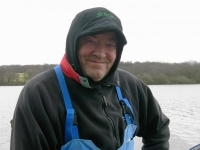Dear Members
St Helens Angling Association has now renewed its Angling Trust Membership, and has for the first time joined Fish Legal. This will give us opportunities to discuss our concerns/ issues with National Governing Bodies, who are representing Angling as a whole, as well as giving us access to expert Legal Advice should this be required. In response to our current invasion of comorants, we have recently been visited by a member of the Angling Trust and assured us that everything we are doing to prevent this problem is well within our Legal Boundaries, and advised us to continue as normal.
Can I request that the committee be informed immediately of any incidents of anti social, aggressive, abusive or disruptive behaviour, to enable us to inform the proper authorities.
Please see below the latest publication from the Angling Trust in relation to Cormorant Control
Regards
The Commitee
After a three year Angling Trust campaign to persuade the government to take action to tackle unsustainable avian predation, three Fishery Management Advisors (FMAs) were appointed in 2014 to cover the whole of England. There are currently two FMAs employed by the Angling Trust who have helped hundreds of fishery managers on both rivers and lakes not only with licence applications, but with practical advice about techniques to protect fish using innovative techniques, such as the use of lasers and lifelike mannequins to deter birds, as well as exclusion tactics and fish refuge.
In April 2016 the Environment Minister Rory Stewart concluded that the pilot project had been successful and that the initiative should continue as it had been successful in providing advice and practical support to angling clubs and fisheries over the past two years about how to protect fish from cormorants and goosanders.
The Minister also confirmed that where appropriate the new area-based approach to issuing licences for lethal control will continue, rather than requiring every individual fishery to submit an individual application. The Minister noted that the system has worked well and that it benefits fisheries, which are an important part of the rural economy.
The FMA posts are funded from rod licence income from the Environment Agency, which has confirmed funding for another year. The scheme has been managed by the Angling Trust under the guidance of a Project Board which includes representatives from DEFRA, the RSPB, Natural England, Environment Agency, CEFAS independent fisheries scientists and the Angling Trust.
The expert advisors have also provided invaluable help with the paperwork required to carry out lethal control safely and responsibly either on an individual basis or via an area based licence, which helps with co-ordination of control throughout a catchment.
Jake Davoile explains:
“There are currently 16 area-based licences in operation across England and all have seen the benefit of working together, and sharing knowledge. These include stretches of rivers, stillwaters, and fish farms, bringing fishery managers together for the greater good – Some have even expanded across whole catchments.
Collating knowledge on the cormorant population is vital, as we get a clear understanding of the feeding patterns of birds, and can develop bespoke strategies to deal with predation. By working as one and utilising the cormorant’s incredible vision in flight, we can maximise the impacts of a shooting strategy if one is required.
“By coordinating shooting, we aim to condition birds in the most efficient manner not to predate on our valuable fish stocks. We have also seen great success using lifelike mannequins, which mimic the river keeper. These are completely weatherproof, easy to move, and by shooting from behind them, birds are conditioned to fear them, thus further protecting your fishery.”
Richard Bamforth added:
“Some area licences extend along 92km of river and include multiple stillwaters. Alongside the clear benefits of a coordinated approach, this strategy also provides us with robust data to take forward to Defra. Remember, if the combined need for lethal control exceeds the current national limit, the limit will be reviewed.”

